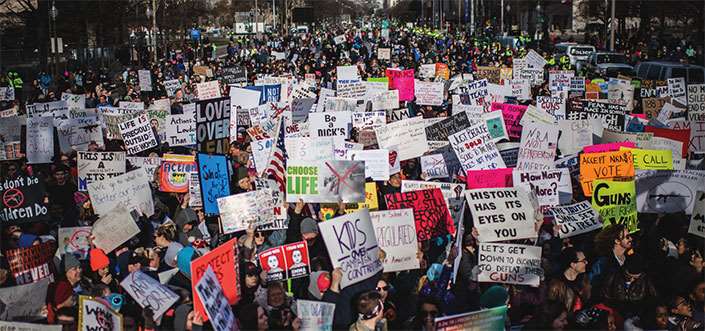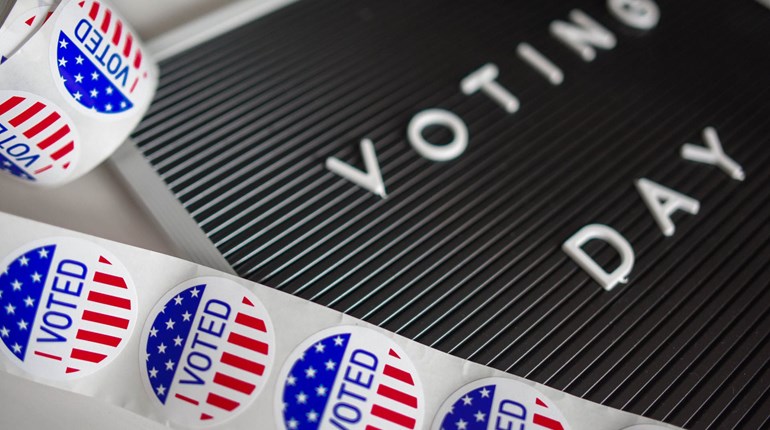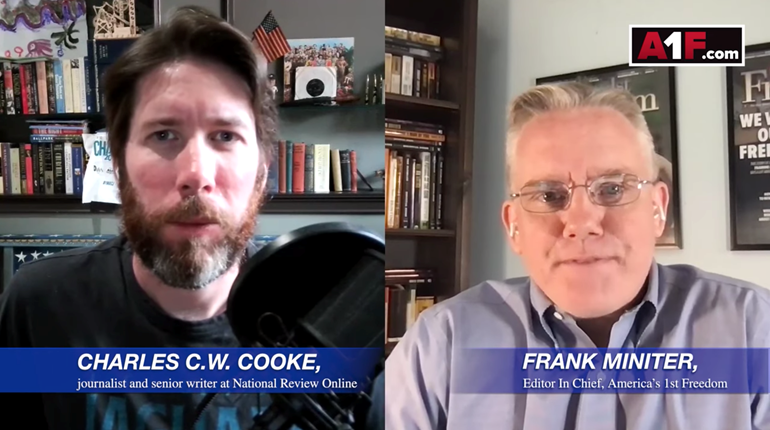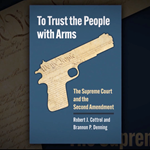

One has to wonder what, exactly, it will take in order to convince the commentariat that to insist, “Nobody wants to take your guns,” is to indulge and to perpetuate an obvious lie.
Polling shows that around one in five Americans wants to abolish the Second Amendment and institute a total ban on the private ownership of firearms—and yet it is broadly maintained in the press that “nobody” holds that position. Protesters at rallies frequently exhibit signs declaring that the right to keep and bear arms “has to go,” yet their words are carefully downplayed. The New York Times runs op-ed after op-ed calling explicitly for repeal of the Second Amendment, and yet the reflexive response is to cast those who object to this posture as “paranoid.” Even when the demand is made by a former Supreme Court justice—more specifically, by the man who penned the revisionist, absurdist dissent that came so alarmingly close to being Heller’s majority opinion—still his words were waved away. Of late, it seems that the habit has become a pathology.
It is obvious why the gun control movement would wish to minimize its most radical elements: The Second Amendment is popular, and extremism in opposition to it is most decidedly not. It is less obvious, however, why the leaders of that movement believe they will get away with this ruse. All told, the arguments that are necessary to sustain the fantasy grow more ridiculous by the day.
We are now asked to believe, per CNN’s Chris Cuomo, that a life-appointee to the U.S. Supreme Court is a “nobody” and a “bogeyman,” and that when he writes a piece titled “Repeal the Second Amendment,” he, in fact, meant something else. We are asked to accept that the post-Parkland protestors whom the media have cast as the vanguard of a sweeping and revolutionary movement are, in fact, not worthy of our political attention. We are asked to suppose that the 20 percent of the population that openly commends rescission should be blithely dismissed. Moreover—and this is perhaps the most irritating presumption of all—we are expected to conflate the intent of the restrictionists with the outcomes they manage to achieve, as if one provides a guide to the other.
During Barack Obama’s eight years as president, gun controllers liked to taunt advocates of the right to keep and bear arms by asking, sarcastically, “Has Obama come for your guns yet?” The answer to which was, mercifully, “No,” but only because the president had been stopped from doing so by his political adversaries. At various points during his tenancy, Obama proposed a ban on so-called “assault weapons,” backed a limit on the size of magazines, attempted through executive action to prohibit the sale of commonly owned ammunition, and praised the confiscation that the Australian government oversaw in the late 1990s. That Obama was prevented from following through with any of these by the strength of public opinion and a strong NRA—and by divided government—was a good thing, certainly. But he cannot take credit both for having suggested those restrictions and for having been thwarted in his push to implement them. That a man failed in his ambitions does not obviate his appetite.
Or, put another way, one cannot read public appeals to repeal the Second Amendment and conclude that, because they are unlikely at present to come to fruition, they were not offered in earnest. It is telling that the vast majority of the sympathetic responses to Stevens’ sweeping invitation objected to the efficacy of his idea rather than to its substance. Variously, Stevens’ proposition was described as “unhelpful,” “unrealistic,” “ill-advised” or “unnecessary,” the rationale behind the lattermost reaction being that there would be no practical need to go through the established process of amending the Constitution when the lower courts can merely read the right to bear arms out of existence.
More common still was the complaint that Stevens and other repealers should have known they would see their words picked up by “gun rights supporters” and used as an excuse for ... well, for what exactly? Stevens did say what he said—and unreservedly. What, pray, is the problem with his critics pointing that out? Essentially, the objection that followed his essay was, “Don’t say that, or they’ll say you’re saying that.” But he was saying that, clear as day.
Ultimately, Stevens’ crime was to say what he said coherently and without obfuscation—that is, to give voice to a position that one in three Democrats supports, but that the party, as a whole, finds tactically embarrassing. Typically, we are treated to hints, insinuations and the sort of half-formed gesturing that leaves sufficient space for half-formed denials. During the 2016 general election, Hillary Clinton’s official position was that she supported the Second Amendment but thought that Heller had been incorrectly decided. But if Heller was incorrect—and the dissent was thus correct—why would Clinton support the amendment at all? Is she especially fond of militias?
Equally ridiculous are the people who assert that Heller allows for all the gun control they covet, and that the Second Amendment should be repealed, and that this does not mean that they want to take away everyone’s guns. But why, if Heller blocks nothing but confiscation, would the underlying amendment need to go? And then there is the all-too-familiar “Australia!” dance, which is performed to perfection in the aftermath of every terrorist attack or shooting. “We need to do what the U.K. and Australia did!” advocates will cry, before berating their opponents for noticing that Australia and the U.K. banned almost all semi-automatic and pump-action firearms—and then confiscated the existing supply. It is simply not possible to praise the gun laws in Australia and Britain without praising confiscation. That so many try to do so when emotions are running high should tell us something.
Rather obviously, the “nobody is saying that” claim is part of a broader attempt to control language, and thus to control the debate—or, to borrow a phrase, to pretend that 2+2=5. Assiduously using the term “gun safety” in lieu of “gun control” might make a speaker feel less radical when describing a given proposal, but it has no effect on the proposal itself, just as describing a standard sporting rifle as an “assault rifle” or as a “weapon of war” does not make that rifle more lethal in the real world. When one turns on the television and sees protest banners declaring, “Yes, we are coming for your guns,” or “ok, we will pry it from your cold dead hands,” or “Take guns out of the equation,” or “Let’s ban guns,” or “Repeal the Second Amendment now,” or “If nobody had a gun, nobody would need a gun,” or “I wish Obama had taken your guns,” or “Freedom is gun free,” or “Ban guns,” or “Guns are stupid,” or “The right to bear arms is antiquated,” or “You can keep your muskets”—all of which were on display in Washington in March—one is being rational in assuming that they must mean what they say.

So, too, are gun owners correct to be alarmed when they read similar language in the pages of The New York Times (in addition to Justice Stevens, “Repeal the Second Amendment” essays have been penned twice by one of the paper’s putatively conservative columnists); in Rolling Stone (“Why It’s Time to Repeal the Second Amendment”); in Vanity Fair (“Let’s Repeal the Second Amendment”); in America (“Repeal the Second Amendment”); in Esquire (“More Democrats Should Be Calling for the Repeal of the Second Amendment”); in the Seattle Times (“Common sense calls for repeal of Second Amendment”).
Ultimately, Justice Stevens’ crime was to say what he said coherently and without obfuscation—that is, to give voice to a position that one in three Democrats support, but that the party, as a whole, finds tactically embarrassing.To be told that to worry about these calls is to be inventing a “bogeyman” is, in practice, to be told that one cannot believe one’s own eyes. How else should a reasonable person translate “Ban guns,” or “Yes, we are coming for your guns,” or “Repeal the Second Amendment now”? How else should one interpret a picture of a revolver with a red line through it?
It would be a touch peculiar to hear somebody say, “Let’s take guns out of the equation,” and to immediately conclude “He must just mean that he wants nothing more than a three-day waiting period on long guns,” or “Ah, look. An advocate for background checks.” Why, then, are we being asked to do so? At the recent gun control rally in Washington, D.C., key speakers promised that if they were given an “inch,” they would “take a mile,” and called for a “gun-free world.” Are we to take them for liars?
The answer, of course, is that we are not. The unlovely truth here is that the gun control movement has spent decades developing a set of sanitized terms and focus-grouped euphemisms (“gun safety,” “illegal guns,” “common-sense reform,” “high-capacity magazine,” “assault weapons” and so forth), and its leaders are now quietly horrified to discover that the people upon whom it is relying for its energy and its momentum have not gotten the memo—and, worse, that they are willing to say aloud what is never to be said aloud. Consequently, they are trying to write the heretics out of the movement. If that writing-out took the form of a hard-won excommunication, that would be one thing. But that, alas, is not the tactic being employed. Rather, the gun-banners are trying to have their cake and eat it too—to harness the people with the signs, but to insist that nobody read them.
The result is Orwellian and abusive of truth, and it requires not argument but deceit. Afraid of losing ground, nervous gun controllers are sticking their fingers in their ears and insisting that what is clearly on display has simply been made up. “It’s not our fault for saying this,” they seem to be contending. “It’s your fault for noticing.”
And so the argument shifts, the goalposts move and the observers are left scratching their heads. “Nobody is saying that,” they tell us. “Nobody at all.”
But, yes. Yes, they are. And we’ve noticed.
Charles C.W. Cooke is the editor of National Review Online.

































